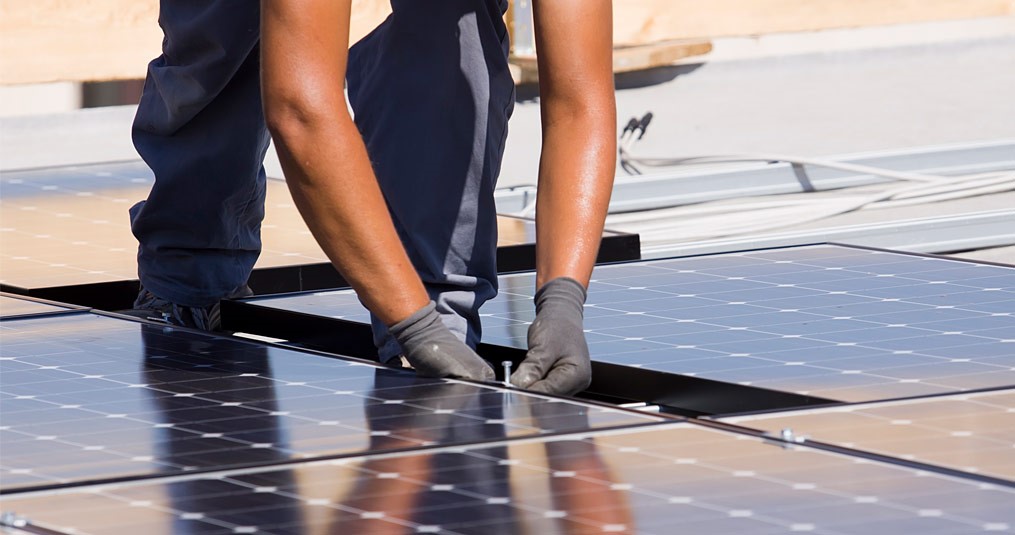Harnessing the power of the sun can dispel even the gloomiest economic outlook. That can lead to a bright career in clean energy for transitioning service members and Veterans, says Solar Ready Vets.
The solar industry ranks as one of the fastest-growing sectors in the U.S. economy, due to federal policies, technological innovations, competitive installation costs, and increasing demand from the private and public sectors for clean electricity. This demand means the solar industry needs skilled workers in many areas, such as installation, production, manufacturing, sales and management.
The solar energy industry is quickly expanding, with an average annual growth rate of 49% over the last decade, and accounting for 43% of all new electricity-generating capacity added in the U.S. through 2020, higher than other energy generation technologies. As of 2020, solar energy generated enough electricity to power 16 million homes!
Military service provides skills in leadership, teamwork, ingenuity and persistence that can easily be applied to a career in the solar industry. There are several solar training programs designed for service members and Veterans to provide the practical knowledge, skills, and experience needed for working in the solar industry. The programs also include tips for translating skills gained from military service to be competitive in the solar job market.
To get you started, the Solar Ready Vets Network offers solar energy training and credentialing programs focused especially on helping service members and Veterans transition into a career in the solar industry.
Solar Ready Vets Network
The Solar Ready Vets Network is comprised of several solar workforce development programs that provide transitioning military service members and Veterans with career training, professional development and employment opportunities in the solar industry. Funded by the U.S. Department of Energy (DOE) Solar Energy Technologies Office (SETO), the Network expands upon DOE’s Solar Ready Vets pilot program launched in 2014 to now offer new solar programs:
- Solar Ready Vets Fellowship Program: Active-duty military service members who are transitioning are placed in 12-week work-based learning programs with solar employers. These opportunities are primarily management and professional positions, such as technical sales, system design, supply chain logistics, project development, operations and installation. Participants from select military bases in regions with high demand for solar workers receive valuable on-the-job training and experience to help them transition to a civilian career in the solar industry. The Solar Foundation leads this program, in partnership with the U.S. Chamber of Commerce Foundation’s “Hiring Our Heroes” program and the Solar Energy Industries Association (SEIA).
- Solar Opportunities and Readiness (SOAR) Initiative: Veterans are provided with solar training, credentialing, professional development and employment opportunities. The goals are to establish an apprenticeship recognized by the Department of Labor, expand the eligibility of solar training for GI Bill benefits, and define expedited pathways to solar certifications based on military experience and qualifications. The Solar Foundation leads this program, in partnership with the North American Board of Certified Energy Practitioners (NABCEP), and the Solar Energy Industries Association (SEIA) is establishing a Department of Labor-recognized apprenticeship, expanding GI Bill benefits to include solar training and expediting solar certifications based on military experience and qualifications.
What to expect with Solar Ready Vets programs
Skilled instructors, usually affiliated with accredited community colleges, deliver coursework in practical skills. Students benefit from in-person training and internships, interviews with leading solar companies and other job search assistance. Solar Ready Vets programs are currently offered at more than 400 community colleges in 49 states. Students also have the opportunity to become certified with the North American Board of Certified Energy Practitioners (NABCEP), a respected and recognized certification organization for renewable energy professionals.
CLICK HERE to learn more about the NABCEP solar credentialing.
Who is eligible for the Solar Ready Vets programs?
Active-duty military, transitioning service members and Veterans are eligible for these programs. Service members participating in the Solar Ready Vets Fellowship Program are paid by the military, and Veterans can use their GI Bill benefits to cover the cost of tuition and materials.
Explore a Bright Career in the Solar Industry
The sharing of any non-VA information does not constitute an endorsement of products and services on part of VA.
Topics in this story
More Stories
In today's fast-paced world, mobile apps are no longer just a convenience, but a necessity for Veterans.
These outreach opportunities and experiences are tailored to the unique needs of the Veteran community.
Each week, we receive job announcements from employers and employment websites—including RallyPoint, VetJobs and HireMilitary—looking to hire Veterans. This post contains links to job listings for the week of April 15, 2024. Each week, we’ll continue to post relevant and timely listings as we receive them, and for the locations listed.







I am an honorably discharged veteran but am not entitled to the GI Benefits. I was in during the Cold War. If I were to be accepted, would the DOE cover all of my training expenses?
I am an honorably discharged veteran but don’t have the GI Bill (I was in during the Cold War). If I was accepted would the tuition and books be covered by the DOE? Thanks in advance.
I am a mature Vietnam Veteran but still desire to work. I have worked in the electric power industry in renewable energy companies in wind, water and other types of generation. I have worked with state power grid companies that require stable, dependable energy to support customer requirements and were penalized for not being fully stable 24/7/365 no matter the weather or equipment issues. I have worked for a commercial wind farm company preparing construction of a 72 turbine wind farm during the nation wide financial problems we had.
I am a retired Veteran with wartime experience. I am interested in hearing more about your program. I currently live in Cocoa, Florida.
Go to https://americansolarworkforce.org/solarreadyvets/ to learn about the program and “Join the Solar Ready Vets Network” to keep informed about program activities and opportunities.
As a veteran, if I was to enter this program, would I be guaranteed to be placed in a solar related job upon graduation? If so then where would this job be located in the country and how much am I likely to earn in this new career?
The current Solar Ready Vets Network program is not directly delivering training, but is connecting veterans with training, certification, and career opportunities that are available across the country. While there is no guarantee for employment, the solar industry is growing rapidly and there are thousands of jobs available. Most are in installation or sales, but there are jobs across the spectrum from general business positions to project management, finance, legal, finance, IT, etc. Depending on relevant prior knowledge and experience many positions will start at entry level wages, but will have opportunity for rapid advancement. Competitive salaries are available for licensed electricians, engineers, and others with relevant construction, and project development/management.
I’d encourage anyone interested in this topic to view the recent webinar that the Solar Ready Vets Network recorded with employers discussing this very topic: https://www.youtube.com/watch?v=r5PVAMyZZ7g
I have solar panels but need charge controller, inverter and batteries. Is there monetary help? If so what is procedure?
The primary financial incentive for solar equipment is the federal tax credit, currently 26% of system costs.
The price is ridiculously high for no reason other than its called solar! ! Anyone can buy the panels them selves and put up a metal frame to track the sun. Then hire an electrician to hook it up! All for about $2500. Yet these companies charge over $10000 to put it on your roof. Which damages the roof and then you can’t do roof maintenance costing even more. Who ever thought of putting it on your roof is utterly mentally ill!
You know, no one else is saying this. You are 100% correct. I think an entry level solar farm could be ground level. Maintenance could be performed & additional panels could be added without the need of a ladder. In Texas the roofs get damaged by hail often. So if the shingles get damaged the whole solar panel system would have to be removed. I guess people don’t want to use up their back yard.
With regard to roof mounting vs. ground mounting, there are good reasons for either option. The number one reason the vast majority of systems are roof-mounted is because they are much cheaper than ground-mounted systems since the structure and foundation that the panels are mounted to is already in place, and no trenching or underground conduit/wiring is needed. The system is also located closer to the electric load so there is less voltage drop (meaning lower gauge, less-expensive wiring can be used), and you can connect to the building’s existing grounding system rather than having to install additional grounding electrodes.
Ground-mounted systems are easier to clean, remove snow from, and otherwise maintain. They can also often be placed in locations and orientations that will result in higher energy output; however, they do take up yard space, which is often OK for larger rural properties, but not as much so for residential neighborhoods and urban locations, particularly those with trees where shading is a major factor.
The prices of solar continue to fall, and if the upfront cost is a barrier, several different financing or leasing options are available that can result in net cost savings from day one. In many places, solar is a much better investment option than almost any other, providing nearly guaranteed rates of returns in the 10-30% range, with the savings on the electric bills being non-taxable unlike dividends or returns on other investments. Just like buying a car or doing any home improvement project, it will be cheaper overall if you are able to pay in cash up front, but the cost of financing solar has also dropped substantially over the last few years as banks and other financial investors have become more familiar and comfortable with these types of loans and leases, and now it is possible to find financing with similar or better terms than other home improvement loans (for instance the FDIC insured Clean Energy Credit Union has rates as low as 4.99%).
DIY is certainly possible, but there are many reasons why this is not an option or a good idea for the majority of homeowners. If you would be comfortable doing your own addition then installing your own solar is certainly a feasible DIY project, if not, then you should think long and hard about everything involved and do your research before buying any equipment. I would also say that the vast majority of electricians and solar installers would not be willing to just wire up equipment that was designed and installed by a homeowner (or even install equipment purchased by a homeowner).
One thing to consider is that while the federal tax credit may be used on the equipment costs and any labor cost that you actually pay someone to perform, typically none of these costs would be eligible for other state or utility incentives for DIY systems (although these incentives are becoming fewer and fewer as time goes on). When you buy a system from an installer, the federal tax credit applies to the full cost of the system, not just the cost of the equipment.
I want to pursue a job in solar
Visit the Solar Ready Vets Network website at https://americansolarworkforce.org/solarreadyvets/
There you can find information on career pathways, training locations, industry certifications, and solar-focused job boards.
And don’t forget to “Join the Solar Ready Vets Network” to keep informed about upcoming opportunities, including career fairs.
Are there any discounts or financial help with disabled veterans to get financial help in having solar installed in their house. Both myself and my husband are 100 percent disabled vets? We have a all electric powered home and our electric bill is sometimes as high as 500 dollars! We have had a couple solar companies come to give us quotes. The one wanted to charge us 85,000 dollars! I don’t trust these companies that advertise on the internet. Are there any companies that the VA uses or can recommend?
Sunrun solar, I got a pretty good vetran deal through them. I’m satisfied so far and I haven’t had any issues or anything.
I am retired military and I worked in the solar industry for the last 11 years before my FINAL retirement. SunPower Corporation is one of the best in the industry. Check out their website. It will be the best decision that you ever made and will NOT cost you any way close to $85k.
quentin
I have had multiple companies ask me to come to come to my house and offer solar. However, I feel that this is very expensive. Specially since all of my appliances are gas (gas stove, gas washer/dryer and gas water heater). I don’t understand why is so expensive. Is there a better pricing for Veterans? If so, how long does it take for it to be paid off? I plan to put in a pool, and would like for this to heat the pool. But, I’m hesitant on this still. I don’t want anybody to come to my house anymore. I just want a sincere and honest answer. Thanks.
A solar company should be designing a photovoltaic system in relation to your electrical usage with consideration for the utility rate structure. Gas usage should not factor into the equation unless the customer is looking to transition these loads to electric and wants to factor that into the PV system design. Even if you have mostly gas appliances, you do have an electric bill, and even a gas heating system uses electricity to blow the hot air or pump the hot water around. A smaller system may be a cheaper initial investment, but a larger system will result in more savings over time since it produces more energy. Typically the larger the system, the lower the cost of energy, and the quicker the “pay-back”, with systems being compared in terms of $’s per Watt installed, but various factors will contribute to what is the most cost-effective system for your situation. There are also specific types of systems for heating pools. These typically pump the pool water through plastic solar collectors, and can be a very cost effective way of heating the pool water.
I like to think of the investment in solar equipment in a similar way to other investment choices. If someone is to invest $15-$25,000 they would be looking at the rate of return, not how quickly they will make their investment back (or payback). A great thing about solar is that the returns (savings on utility bills) are “tax free,” which makes them an even better investment than something with similar returns. A hypothetical $15,000 solar electric system (after tax credits) could save you $1,500 a year on electricity, or a 10% rate of return (with payback period of 10 years). If you got the same rate of return on another investment (good luck with that!!), then you would have to pay tax on the interest/dividends earned, cutting your net income by your tax bracket (say ~30% of your savings meaning you are only getting a 7% net return).
But solar is also an investment in the property, like adding that pool you’re thinking about. Rarely will a home improvement project result in a value more than what was paid for, but, unlike the pool or most other renovations, the solar will actually save money and you can determine a rate of return or payback.
Any solar proposal should be discussing how much you will save on your bill and what the rate of return on the investment is, not just how much the system will cost. There are many factors that go into the rate of return, such as the amount of sunlight at your location (climate, latitude, shading, roof pitch, etc.), electricity rate, and utility rate structure, etc., so you really need a site specific proposal from an installer (and it is certainly recommended to compare a few different quotes). For most of the country though, solar electricity is now cheaper than the electricity you are buying from the utility.
I’m a veteran how can I get solar on my house